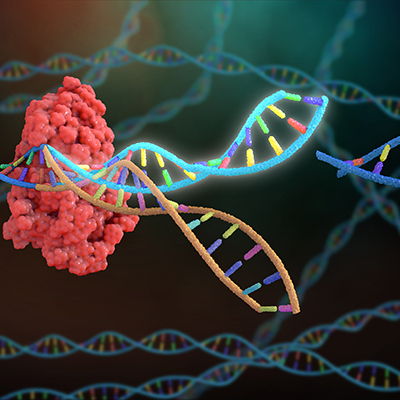 HIV nanoparticle vaccine induces strong T-cell responses in early-phase clinical trial
HIV nanoparticle vaccine induces strong T-cell responses in early-phase clinical trial
An HIV nanoparticle vaccine has induced strong T-cell responses in a first-in-human clinical trial, marking a step toward the development of a product that protects against the virus. Read More
 Gene editing tool may reduce antimicrobial resistance spread
Gene editing tool may reduce antimicrobial resistance spread
A tool that could help reduce the spread of antimicrobial resistance shows early promise. In an article published Thursday in Microbiology, researchers describe the use of CRISPR technology to eliminate resistance in a wide range of bacteria. Read More
 Illumina CEO remains on the board, chairman is voted out
Illumina CEO remains on the board, chairman is voted out
Illumina shares traded on the Nasdaq rose more than 2% Friday morning to $197.63, a day after the firm's shareholders voted out Chairman John Thompson. Read More
 New antibiotic targets deadly hospital superbug
New antibiotic targets deadly hospital superbug
Scientists used artificial intelligence (AI) to discover a promising antibiotic that may help doctors target Acinetobacter baumannii, a deadly, drug-resistant pathogen that often strikes vulnerable hospital patients. The study, published Thursday in the journal Nature Chemical Biology, identified the antibacterial compound abaucin in response to the urgent need for new ways to treat A. baumannii infection. Read More
 Scientists seek HIV cure by transplanting stem cells to monkeys
Scientists seek HIV cure by transplanting stem cells to monkeys
Scientists are seeking a cure for HIV via stem cell transplants on monkeys. Their research, published Thursday in the journal Immunity, describes the process by which two of four non-human primates were cured of HIV following stem cell transplantation. Read More
 FDA grants full approval for antiviral pill to treat mild-to-moderate COVID-19 in adults
FDA grants full approval for antiviral pill to treat mild-to-moderate COVID-19 in adults
The U.S. Food and Drug Administration (FDA) on Thursday approved Pfizer’s Paxlovid, an oral antiviral drug, for the treatment of mild-to-moderate COVID-19 in adults. Read More
 Chemical compound stimulates nerve regeneration, protects heart tissue
Chemical compound stimulates nerve regeneration, protects heart tissue
Researchers have identified a compound that can stimulate nerve regeneration after injury, as well as protect cardiac tissue from the type of damage seen in heart attacks. The study, published Wednesday in Nature, identified a chemical compound called 1938, which activates the signaling pathway of phosphoinositide 3-kinase (PI3K), an enzyme that helps control cell growth. Read More
 Study of woman who cannot feel pain finds molecular explanation for phenomenon
Study of woman who cannot feel pain finds molecular explanation for phenomenon
Researchers have uncovered the biological effects of a mutation that causes its carrier to live virtually pain-free, heal more rapidly, and experience reduced anxiety and fear. Read More
 Biomarkers in a study predict stem cell transplant risks
Biomarkers in a study predict stem cell transplant risks
Risk biomarkers uncovered in a recent study may help medical staff predict which donor stem cell transplant patients are likely to develop a potentially deadly side effect called sinusoidal obstruction syndrome (SOS). Read More
 Medical records link vaccination against COVID-19 to reduced risk of non-respiratory symptoms
Medical records link vaccination against COVID-19 to reduced risk of non-respiratory symptoms
Fully vaccinated individuals had a lower risk of dying or developing some non-respiratory symptoms than people without protection against COVID-19 during the Delta and Omicron waves, a retrospective review of medical records has found. Read More
Member Rewards
Earn points for contributing to market research. Redeem your points for merchandise, travel, or even to help your favorite charity.
Research Topics
Interact with an engaged, global community of your peers who come together to discuss their work and opportunities.
Connect
Tweets by @ScienceBoard



